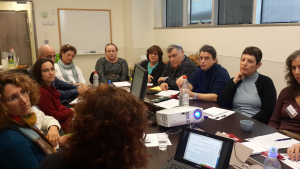At a loss for words
I am at a loss for words…
With all the respect that I feel for the business that I established with my own two hands, and the translators from all over the world who work with me, sometimes there are instances when one encounters a particular word that, simply cannot be translated, no matter what.
Have you ever tried to translate “Bon appétit” to English? It just doesn’t work.
Every language has a selection of words that will cause the most competent translators to scratch their heads in puzzlement, as they are unable to find a way to translate them into another language.
Here are a few examples of words that are simply impossible to translate into any other language:
- Waldeinsamkeit (German) – The feeling of being alone in a forest
- Cualacino (Italian) – The mark that a cold glass leaves on the table
- Iktsuarpok (Inuit — language of the Eskimos) – The feeling of expectation that leads one to peep out of the igloo to see if anyone is coming
- komorebi (Japanese) – The sunlight streaming through the leaves of the tree
- Pochemuchka (Russian) – A person who asks a lot of questions
- Sobremesa (Spanish) – The time devoted to conversation after a meal
- Jayus (indonesian) – A joke that is told so badly and is so UNFUNNY, that you just can’t help laughing
- Pana Po’o (Hawaiian) – The action of scratching the head, which is intended to help you remember something you had forgotten
- Depaysement (French) – The feeling you have when you are somewhere that is not your homeland
- Mangata (Swedish) – The reflection resembling a path of the moon on the water
So what does an interpreter do when he encounters a word for which he has no way of translating into the target language?
Unlike the translator of a written text, who can spare the time and the thought to find creative ways to rephrase, an interpreter needs to respond rapidly and proficiently to provide an immediate response to the missing word.
The translation work in an institution, such as a hospital, is a good example of the difficulty an interpreter encounters in the face of professional and medical terms that can’t always be translated word for word.
Precisely for this reason, and due to the fact that Lichi Translations is providing Hebrew-English interpreters for the accreditation process in many of Israel’s hospitals, I initiated a training course for interpreters seeking training.
In an almost last minute effort, we created a curriculum and organized the strategic location within Ichilov Hospital (Tel Aviv’s largest hospital), and held an intensive two day training course prior to the accreditation process that was about to begin the following week at the hospital.
The special aspect of the training was the fact that it took place within the hospital in real time. The interpreters had a chance to do “live” interpretation during the doctors’ visits in the department to become better acquainted with the work of the staff, as well as the medical jargon, which could be really hard work for the interpreter.
I was proud to see how interpreters integrated the subject that had been taught in the training class into reality of the situation. The interpreters, rapidly gained control of the material and by the end of the second day were already chattering away in “medicalese” like George Clooney in E. R.!
So if someday you want to translate a book of poetry from Swedish that describes the light of the moon sparkling on the waters of the lake between the Goteborg Mountains, bear in mind that it won’t be easy.
Regarding anything concerning the medical world, however, and hospitals — you know whom to speak to….
פוסט זה זמין גם ב: Hebrew










Leave a Reply
Want to join the discussion?Feel free to contribute!